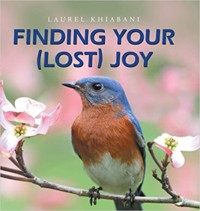Title: Finding Your (Lost) Joy
Author: Laurel Khiabani
Publisher: XlibrisUS
ISBN: 978-1-9845-8254-6
Genre: Poetry / Photography
Pages: 36
Review by: Beth Adams
At first impression, opening Finding Your (Lost) Joy by author and poet Laurel Khiabani
struck me with its original galley text layout. Each page has 5 boxes; 4 of them contain
a one-line thought, and the center box contains a photograph. The layout made me
think of a Japanese Bento-Box, where individual items are separated by a barrier, not to
blend into the other flavors. In an analogous way, this is the intention of the author, to
have an ample empty space within each of the text boxes to be used by the reader; to
fill in his or hers thoughts inspired by the prose of the poetic phrase, perhaps glancing at
the photo while thinking of how emotions, feelings and people relate to each reader.
This makes Finding Your (Lost) Joy in many ways a “work-book” for readers to enter
and develop their own poetry, memories, or emotions within the squares. As coloring
books for children brings their focus to the line-drawings, Finding Your (Lost) Joy brings
out the poetic inspirations of each of the readers. In this fashion, Laurel Khiabani has
created something extremely creative in this crowded genre of poetry.
Many of the photographs are familiar to people living in the San Francisco Bay Area,
with the iconic wind-swept Cypress trees silhouetted along the cliffs by the Pacific
Ocean; or the intricate architecture details of The Palace of Fine Arts. Most of the
pictures are close-ups of the flowers around the area, such as one might see in the
Rose Garden within Golden Gate Park. The area for writing in readers’ thoughts will,
upon completion, allow for this book to become a time-capsule of the book owners;
hopefully opened in months or years down the road to become a treasure of their own
past feelings.
As an example, Laurel Khiabani writes in one box, “My Happy Space,” of which a reader
might think of a place where he or she feels good, such as a bedroom, or within a
cathedral of Redwoods. Later in life, that same reader may have moved on, to have
others places of peace and solitude; and be once again reminded by the jolt of their
written answer, filled-in the pages in response to the book’s layout.
Under the minimalist design of “Less is more,” Laurel Khiabani has created a work-book
for interactive reading and writing for those paging Finding Your (Lost) Joy. As stated,
the biggest surprise one will possibly have is to re-open this book, years in the future,
and see how they have changed; as well as keeping dear to those who are now and
ever will be in your life.



Follow Us